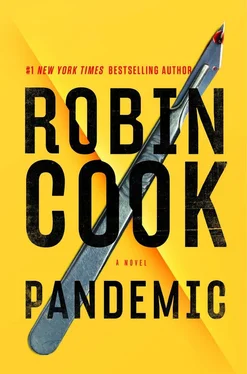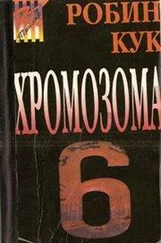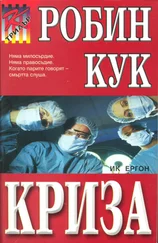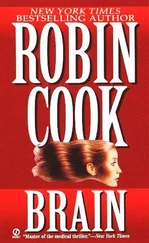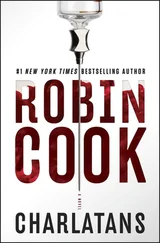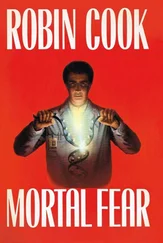The comparison with Jack was stark, especially when the two were standing right next to each other as they were now. Jack’s hair was a light brown, cut moderately short, with a blush of gray over his temples. His eyes were the color of maple syrup and his complexion suggested he had a slight tan even when he hadn’t been in the sun for months. At six feet two inches tall, with an athletic build from bike riding and street basketball, he seemed to tower over Lou, whose habit was to hunch over as if his head were far too heavy.
“I don’t know,” Lou admitted. He was having trouble making up his mind.
“How about a water,” Jack suggested. He knew the last thing Lou needed was more coffee. What he really needed was sleep.
“Yeah, water’s fine,” Lou said.
Jack got two waters and sat down across from Lou.
“You’ll let me know what toxicology shows on the second case,” Lou said.
“Absolutely,” Jack said. “As soon as I know.” All three cases that Lou had come in to watch that morning involved the NYC Police Department. The one Lou was currently referring to was a “death in custody” case. During the autopsy Jack had been able to show Lou that the prisoner’s hyoid bone had been fractured, which was a clear demonstration that a lethal choke hold had been used. It had happened during an arrest. The question now was whether the force was justified or whether it was excessive. The neighborhood where it had happened was up in arms and wanted answers.
Lou was also awaiting final word on the first case he had watched Jack handle that morning. It, too, was an arrest that had gone bad, resulting in a shootout with the victim holed up in his car, where he was hit four times. Several bystanders claimed that the victim had yelled “enough” and had stopped firing, yet still the police shot him. Once again it was a potential PR nightmare for the police department, and a tragedy if it proved to be true. To get answers, Jack had painstakingly tracked all four bullets in the man’s body and now wanted to re-create the scene in the special laboratory in the new high-rise building to figure out exactly what had happened and when.
“It’s been an interesting morning,” Jack said. “I’m especially sorry that I couldn’t be more help for your buddy. Probably the case is going to turn on the suicide note and whether it’s authentic. Divorce isn’t fun, but it is a lot better than homicide, if that’s what the case turns out to be.”
“Enough about me and my problems,” Lou said with a wave of dismissal. “What’s up at the Stapleton-Montgomery household these days? I haven’t talked to you or Laur for ages.” Lou had met Laurie Montgomery, Jack’s wife, before Jack had been hired by the NYC OCME. Lou and Laurie had even briefly dated until they both sensed it wasn’t to be and became fast friends instead. When Jack came on the scene, Lou had been his advocate. Laur had been the name one of Lou’s daughters had used when she’d first met Laurie, and, thinking it cute, Lou had adopted it as well.
“Please,” Jack said. “Let’s not go there.”
“Uh-oh.” Lou leaned forward over the table. “Knowing you as I do, I don’t like the sound of this. What’s up?”
“I don’t know if I want to get into it,” Jack told him.
“If you don’t talk to me, who are you going to talk to?” Lou arched a brow. “I love both you guys.”
Jack nodded. Lou was right. He was the only person Jack could talk to about what was going on. The question was whether he wanted to talk at all. Ever since the plane crash that annihilated his first family more than twenty-five years ago, Jack had more difficulty than the typical male in talking about emotional issues. When problems arose, he much preferred to work harder and play harder, which meant more hours at the OCME and more hours playing evening basketball. But even he knew such a strategy had the major drawback of not contributing to a possible solution. It was like sweeping dust under a rug or sticking your head in the sand.
“Whatever it is, it has to get solved,” Lou said. “Listen. You and Laurie are my last holdout for belief in the possibility of marital bliss, especially with this new possible homicide disaster with my buddy Walter. One of the reasons I haven’t been in touch with you two over the last month or so is that I have met a new woman, and I’m actually toying with the idea of tying the knot once again.”
“Congratulations, my friend.” Jack’s tone didn’t hold a lot of enthusiasm.
“I hear the reservation in your voice,” Lou said. “Come on! Talk to me. Does it have something to do with Laur’s becoming the chief here at the OCME?”
Two months ago, Dr. Harold Bingham, the chief medical examiner, had passed away following a heart attack, and an ad hoc NYC search committee had recommended that Dr. Laurie Montgomery take over the reins. The offer had surprised both Jack and Laurie, but particularly Jack, especially after Laurie had accepted. Jack had always hated what he called the bureaucratic bull crap that was a necessary adjunct to being a medical examiner, having little patience for kowtowing to powers-that-be in any form or fashion. It had taken years for the OCME to establish a degree of political independence, particularly from the police or the people who controlled the police, so as to become an unbiased voice for the dead. The importance of such independence was obvious from the three autopsies Jack had done that very morning. All too often in the distant past, the mayor or the police commissioner would tell the medical examiner what he was to find on his autopsies. Jack prided himself on his ability not to let the opinions of others influence him. But with his wife as chief and the line between his personal and professional lives suddenly blurring, his hard-won impartiality had taken on a whole new complication.
“I can tell you this,” Jack said. “I was shocked when she took the job. Between you and me, she’s not having all that much fun. Not only is she now beholden to some degree to her bosses, meaning the mayor and the Commissioner of Health, she rarely gets to do what she does and likes best — namely, forensic pathology. Those two politicos have her running ragged just to maintain funding. She doesn’t like confrontation, nor is she good at it, thanks to her autocratic cardiac surgeon father, who tortured her when she was a teenager.”
“So is she bringing home her frustrations and taking them out on you?” Lou asked.
“Well, you know Laurie. Whenever she does something, she does it one hundred and ten percent. She’s the boss now both here and at home.”
“I’m sorry to hear it,” Lou said. “Have you tried to talk with her about it all?”
Suddenly Jack put down his water with such force on the table that Lou started, spilling some of his own. Jack then threw up his hands and shook his head in disbelief. “I don’t believe myself,” he admitted. “I don’t know why I’m even saying all this.”
“I think it’s pretty obvious,” Lou said. “It’s bothering the hell out of you. I can tell.”
“No, it’s not,” Jack snapped. “Oh, it’s bothering me some, especially when Laurie has been trying to dictate how much basketball I should be playing or telling me I shouldn’t be riding my new Trek road bike to and from work. But her bringing her CEO problems home isn’t the issue that’s driving me up the wall. Laurie is a big girl, and I’m a big boy. It’s Emma who’s turned me into a basket case.”
“Oh, no,” Lou said. “What’s with Emma?” It had been a while since he’d seen Jack and Laurie’s daughter, who’d just turned three.
“Two weeks ago our pediatrician tentatively diagnosed her with autism.”
“Good God,” Lou said.
Читать дальше
